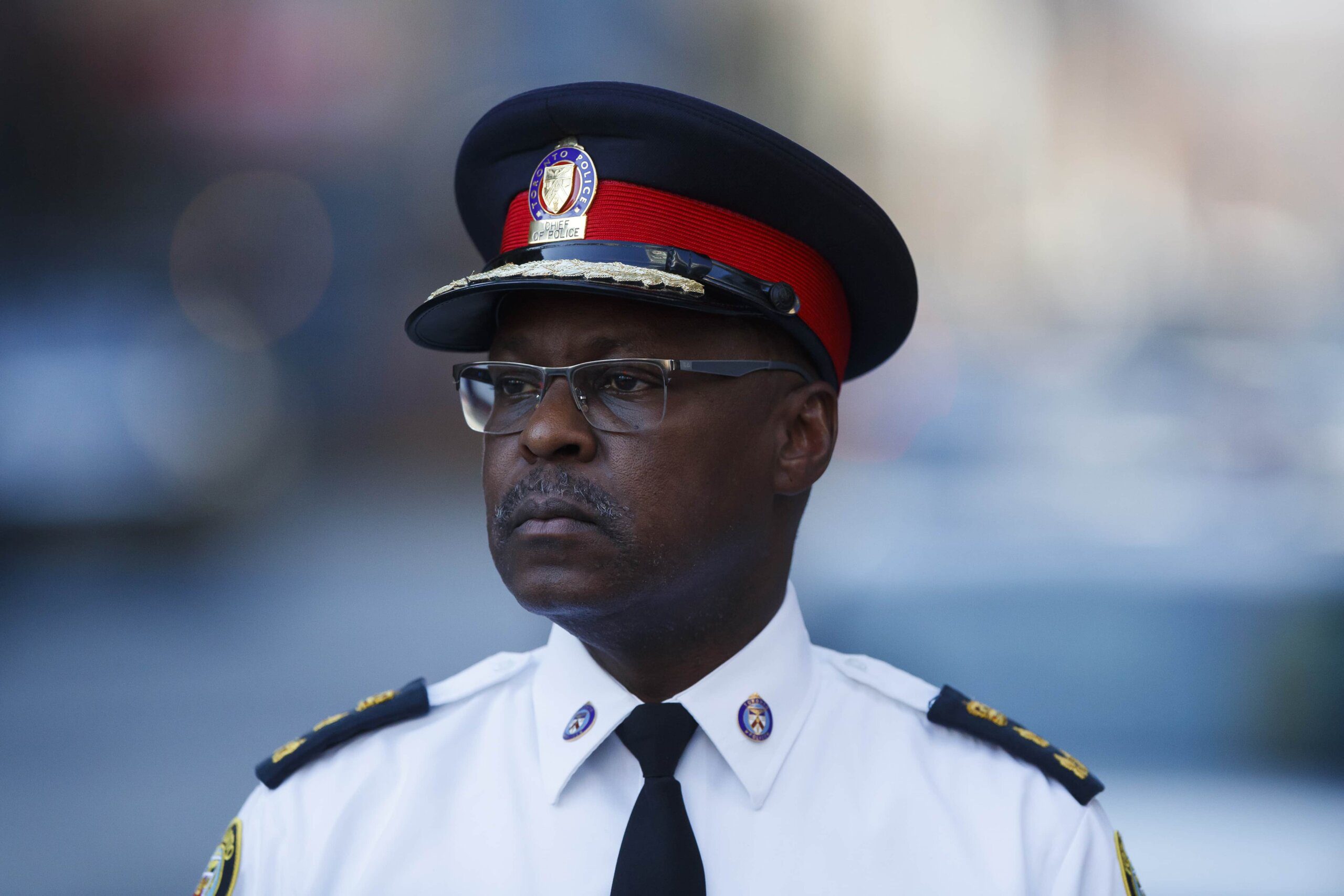Mark Saunders is the former Toronto police chief who ordered the attack on Black Lives Matter (BLM) protestors in 2016 during a protest to support Andrew Loku, a Black man killed by Toronto Police Services (TPS) in 2015. During his tenure as Toronto police chief from 2015 until 2020, Saunders also became embroiled in controversy over the police killing of Loku, and the resulting report that found no wrongdoing at the hands of police, despite Loku being killed within seconds of an emotional distress encounter, and the treatment of Black Lives Matter protestors supporting his case. Saunders has also just announced he will be running for Toronto mayor. In fact, he announced his intention to bid on the seven-year anniversary of TPS attacking people camping out at BLMTO Tent City. BLMTO Tent City was a 15-day occupation in support of Loku.
Toronto residents are concerned that just a few years later Saunders is wanting to take on more responsibility in the city, something that many of whom have felt the blunt force of his directives—including encampment residents, Black communities, queer folks, amongst others—feel he is not equipped for. What would someone who has such a poor track record with community do with expansive powers such as a mayorship? It’s concerning for many in the city.
Jess Kirk, the executive director of the Wildseed Centre for Art & Activism, a community centre for Black communities and their supporters in downtown Toronto, says a Saunders mayorship worries her. “It was under Mark Saunders’s leadership as chief of police that the officer who shot and killed Loku did not face charges and remained unnamed,” she said. “A Saunders mayorship runs the risk of living in a city wherein criminalizing communities and maintaining the status quo are prioritized over meaningful supports and services.”
In 2016, BLMTO gathered at Toronto Police headquarters after being told to move along from their vigil at City Hall for Andrew Loku. BLMTO had set up a small gathering outside of the downtown headquarters and were trying to get attention around the Special Investigations Unit (SIU) verdict that TPS were not to be charged for the murder of Loku, who was killed within two minutes of the encounter on a training shift where one officer was training the other on how to de-escalate someone in emotional crisis—on a call to a building full of people with mental health diagnoses.
On the spring equinox in 2016, we were a small group of about 40 people gathered around a megaphone and small barrel of fire to keep warm, similar to union picket lines across the city. Suddenly, police stormed out en masse from the building and advanced on the crowd. They turned over the fire barrel onto the sleeping bags and tents set up and poured a thick, black chemical all over the protest materials. They grabbed people, held people to the ground and chased people. It was fast, riotous, dangerous and scary. This was Day 1 of BLMTO Tent City. Saunders had tried to squash the protest, but ended up drawing attention to it due to the police attack—and support poured in from across the city. The protest ended after 15 days with a march on Queen’s Park and a meeting with then Ontario premier Kathleen Wynne on the steps of the legislature.
“The people of the City of Toronto cannot afford Saunders in another position of power.”
Saunders’s bid for the mayorship comes just weeks after former mayor John Tory resigned in disgrace following a scandal about abuse of power and sexual impropriety. Bids officially open April 3 and the election will be held on June 26, 2023. In many ways Saunders’s bid is a non-starter: he is too polarizing a candidate to be a serious contender—even for the right. Yet, it’s worth reflecting on why a former police chief mayorship would be a disaster for Toronto. Because that’s what many believe it would be: an unequivocal disaster. In a city that is still recovering from Saunders’s term as police chief, Sandy Hudson, co-founder of Black Lives Matter Canada, says Toronto cannot afford Saunders in another position of power.
“This is a man whose callous refusal to engage with the concerns of community members while chief resulted in him being run out of office. The problems are only larger and more complex at the mayoral level. This is the man who blamed the LGBTQ2S+ community after dismissing the reality of a mass murderer targeting queer men of colour in the Village. This is the man who fought vigorously—and lost—for police to continue racial profiling through carding. This individual oversaw a police force mired in controversy and corruption, and was directly implicated in some of its most high-profile failures. I am not sure why anyone would consider him a serious contender for mayor, unless they were interested in the continued decline of the city.”
Hudson hits the nail on the head—after Saunders’s team botched the Bruce McArthur investigation and neglected queer and trans communities’ cries for help and support, I don’t know why anyone would ever trust Saunders or the TPS. The SIU investigation into police handling usually finds no wrongdoing in the role of the police in civilian harm (they are made up of all retired and ex-cops, after all). However, even the investigation unit agreed that TPS had botched the McArthur case. If we can’t trust in the police to listen to the community and address the disappearance of countless men of colour from the Village, why would we want to have these same folks running the city?
The continued decline of Toronto is what is at stake here in this mayorship. In announcing his bid, Saunders proclaimed that a safer transit system and safer city would result from his run.
“The last thing Toronto needs is a former police chief as the mayor,” Chanelle Gallant, one of the organizers present during the infamous bathhouse raids of 2000 at the Pussy Palace events by Toronto Police, says. “A former cop like Mark Saunders just doesn’t understand what a city actually needs to be safe and healthy—things like affordable housing and transit, fully funded public services like parks and programs for kids, a thriving arts sector. Toronto is in the throes of an affordability crisis, and we have to make sure that every single tax dollar gets spent on what people need; not on punishing the poor. A pro-police mayor like Mark Saunders would make the city less safe and less livable.”
People learned a lot during the last three years of the COVID-19 pandemic about how they want to live and what they want from their city to make it more safe and more livable. Civic engagement is up, with people pouring into the streets in 2020 to demand justice during the uprisings of that summer. Activism around encampments and economic justice, climate change and more has spread throughout Toronto. People are invested in making a city that is more livable for all of us. The practice of criminalizing Black, racialized, queer, trans, poor, disabled, Deaf and Mad communities costs billions.
Gallant says, “What people should know about Mark Saunders is that under his watch, the Toronto Police Service’s budget grew to over one billion dollars. Saunders led demands to increase the police budgets year after year, even as this starved public services in our city. People should know about the egregious instances of police indifference and misconduct that occurred under Saunders’s administration, including numerous police killings of people of colour.”
Toronto doesn’t need the stress and violence that a pro-police mayor would bring: policing doesn’t bring more safety and security for many marginalized people in our city.
Toronto doesn’t need the stress and violence that a pro-police mayor would bring: policing doesn’t bring more safety and security for many marginalized people in our city. A pro-police mayor would open the door for more budget increases, more police presence in targeted communities and more harassment of marginalized groups at the hands of the police. Put more pessimistically, their body count has been mounting. Increased policing ends up costing people their lives.
On the heels of a huge defund campaign spread out through the uprisings of 2020, we are witnessing a pendulum swing toward the right. During the summer of 2020 there were calls for defunding the police and reinvesting in communities—and these calls were not only widespread but interconnected and international in scope; the defund movement was truly global. People thought the calls for defunding in 2020 would lead to less investment in policing, but, in fact, police budgets have continued to rise across Canada. Police taking on leadership roles is increasing and significant in our current timeline—from pro-police Kamala Harris taking on the vice presidency in the U.S., to New York City having a cop mayor, to Vancouver having a pro-police mayor. What will it mean for our cities to be led by cops and their fans? What will police accountability look like?
Now is not the time to turn away from what the community has been calling for. Now is the time to turn toward a future city that will be welcoming and supportive for all Torontonians. We need to start dreaming into new models of governance built on abolition and the idea of reinvesting in community supports and services to foster safety and security. In our future city of Toronto, we will need something better than what we have now to lead us forward. “[The city needs] someone who will actually govern for the people, investing our resources in the services that create safe, livable, creative and inspiring cities,” says Gallant.
She continues, “In my dream future, we would not have a mayor’s office that essentially works for those with wealth and power. We would have democratic structures where low-income people have the same say over how our city is run as the lawyers and politicians.
Hudson agrees. “An abolitionist approach would at the very least see a candidate who shared the concerns of the average Torontonian, and didn’t dismiss our most urgent concerns.”
“An abolitionist city is one that boldly works toward divestments from policing and investments in services that build geographies of safety,” Kirk says. “One where affordable housing, better transit systems and community crisis services are better supported.”
She continues, “I will be voting for the candidate who commits to championing more affordable housing, better transit systems and investing in community crisis services and other social services to make Toronto more livable for all.” This is not Mark Saunders.


 Why you can trust Xtra
Why you can trust Xtra


